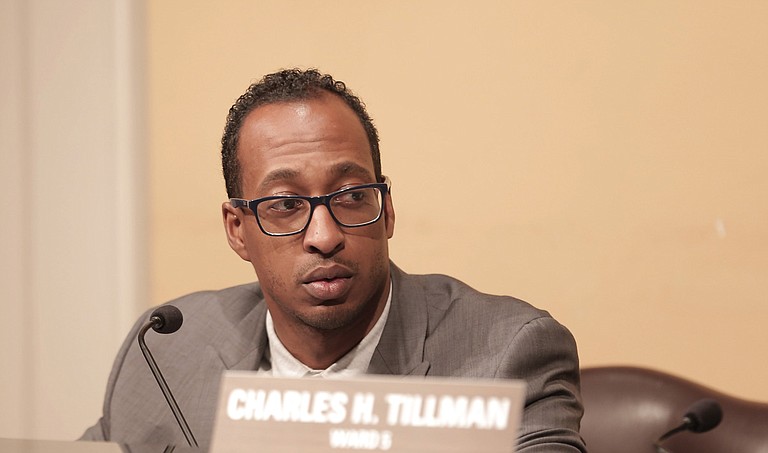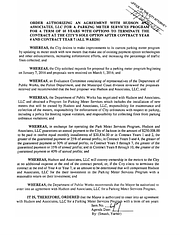Jackson City Councilman Melvin Priester Jr. says he is unsure about the proposed 10-year privatization contract with a Missouri company to update and run Jackson’s municipal parking-meter program. Photo by Imani Khayyam.
Wednesday, November 30, 2016
JACKSON — The City of Jackson could lose a chunk of future earnings from parking meters and municipal fines in exchange for a steady, smaller burst of revenue for the next 10 years if it signs a contract with a private St. Louis, Mo., firm to maintain and operate its parking meter and fining operations.
The City's public-works director, Jarriot Smash, told the council on Nov. 15 that the administration cannot handle growth or renovation of the system internally.
"Our staff is working with antiquated meters, as you know, and we don't have a full staff of people," Smash said. "This gives us the opportunity to expand that significantly."
The deal with Hudson and Associates outlines a complete privatization of the parking services, including: installation of new meters for $1.4 million, collection from the meters, maintenance of the meters, enforcement of parking ordinances including deploying "boots," and collection of past due fines. A municipal judge would still handle any arbitration of the violations, but the public-works department provided the council documentation stating that Hudson volunteered to operate its own appeal system as well.
The question then, for the council and the City, is whether forfeiting future municipal court fines and parking-meter revenue is worth the monthly payment Hudson offers.
Doubling Meters Costs
Smash estimated that Jackson has 1,000 meters, concentrated in the downtown area. At the moment, parkers must pay 50 cents an hour, but that would go up to a dollar under the new plan. The meters run from 9 a.m. to 5 p.m. on weekdays, assuming that the City does not offer its policies in the near future. Weekends are free, and the police department's traffic ticket division, usually two officers, has recently been operating on a reduced staff of one. The City paid $53,256 for those two officers in the last year.
"This part of our city is not operating right now," Ward 7 Councilwoman Margaret Barrett-Simon said about the parking division, adding that if it was a matter of lost revenue, "that's apples and oranges because we don't have any revenue right now."
The estimated revenue for the meters for the City hovers around $2 million per year but only if the parking spots are completely full for the entire day.
In a memo from the public works department for the Oct. 18 meeting, when the administration first presented the proposal, Smash and his department reported that the City receives around $180,000 a year in revenue from the parking meters with about $80,000 in overhead attributed to "labor and supplies."
The City also generates revenue from the meters in the form of fines for expired meters and other parking violations. The City's memo states that the Municipal Court reported revenue of $106,105 for 2015. Add that to the revenue from the parking meters, and the program takes in a total of $340,108 in revenue from activities associated with the meters.
Subtract from that amount the City spends on its two officers and the estimated maintenance a year, a combined annual $133,256, and the total estimated "profit" for the City for a year based on the provided numbers is around $206,852.
That means that in fiscal-year 2011, the City walked away with approximately $230,000, with revenue from meters alone at $199,228, before costs.
The New Deal
First, and most attractive to the City in such budget-tightening times, Hudson and Associates would replace all the outdated, coin-based meters with modern, digital currency-capable machines. That would open up more revenue-capturing streams for the company to recoup its $1.4 million that it claims the upgrade would cost.
Then, for the length of the 10-year contract, Hudson would take over the full parking-services operation, except that challenges would still go to the municipal court for arbitration. In exchange, Hudson will collect all the revenue each month, sending the City a check for $20,834 per month, no matter how much revenue it pulls in. At the end of the year, Hudson would determine its annual revenue and, if it exceeds a percentage scale for that year, send the City a larger chunk of cash.
In this way, the new plan is a gamble: The City estimates the company can pull in more than the annual combined total for municipal court fines and parking revenue than the City has in the past. And in exchange, Jackson does not have to put up the $1.4 million to renovate the system's physical infrastructure—the meters. For some perspective, without adding in expenditures, Hudson would have to bring in $1,250,000 in revenue to meet the minimum amount it owes the City in the first year, $625,000 if split between the two sources.
"There is a significant amount of risk that (Hudson) or anyone that undertakes this for the city would have to face," Smash said.
Cory Elliot, vice president of business development for Hudson and Associates, said during a Nov. 28 phone conversation that she could not give any statements on the project, but pointed to work the company did with St. Louis and its parking-meter program. She also said Hudson considered the changes that Oxford made to its system in the last several years. The town installed meters that can take card payments.
The city council tabled the proposal at its regular meeting on Nov. 29, but Ward 2 Councilman Melvin Priester Jr. said during an interview the day before that he was still unsure about the deal on the table.
"I think there are still some questions that I need answered before I feel comfortable voting on this issue," Priester said. "It's important to make sure that the City is protected, the numbers are right, and that we will have a good operator."
"We are trying to make sure we don't leave money on the table, but at the same time if there is not the leadership internally to operate the program as it should be, then we have no choice but to turn to the private sector," Priester said. He added that the term of the contract and the possible depreciation of the meters that Hudson would install concerned him.
Email city reporter Tim Summers Jr. at [email protected]. Read more local news at jfp.ms/localnews.


Comments
Use the comment form below to begin a discussion about this content.
Sign in to comment
Or login with:
OpenID